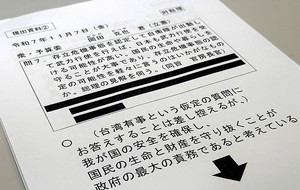THE ASAHI SHIMBUN
July 1, 2024 at 18:44 JST
 The Fair Trade Commission, headquartered in Tokyo's Chiyoda Ward, has recently tried to crack down on companies that force subcontractors to store equipment without paying. (Asahi Shimbun file photo)
The Fair Trade Commission, headquartered in Tokyo's Chiyoda Ward, has recently tried to crack down on companies that force subcontractors to store equipment without paying. (Asahi Shimbun file photo)
The Fair Trade Commission is planning disciplinary action against a Toyota Motor Corp. subsidiary that forced its subcontractors to store auto part molds without payment, sometimes for decades, sources said.
Toyota Customizing & Development Co. made about 50 subcontractors retain about 650 of the company’s molds and testing equipment, despite there being no plans to use them again, the sources said.
Over the past two years, the total costs of holding onto this equipment amounted to several tens of millions of yen.
Among the FTC’s findings are cases of involuntary storage lasting as long as 30 years, with potentially hundreds of millions of yen in resulting fees.
Additionally, despite not conducting inspections when accepting goods from the subcontractors, the subsidiary later returned some and claimed they were damaged, further adding to the subcontractors’ costs.
The price of the returned goods exceeded 50 million yen ($310,655) in total over the last two years.
The FTC confirmed the company violated the subcontract law by unfairly forcing subcontractors to provide economic benefits. The watchdog is scheduled to issue a cautionary notice to the Yokohama-based subsidiary, calling on it to take steps to prevent a recurrence.
Toyota Customizing & Development is expected to pay the costs that were unfairly covered by the subcontractors, according to the sources.
Toyota holds a 90-percent share of the subsidiary, which designs and develops Toyota’s special-purpose vehicles and manufactures auto body parts, according to its website.
“We are currently investigating the facts of the incidents. We have been striving to comply with the subcontract law and continue to watch over our subsidiaries to thoroughly obey the law,” Toyota said a statement.
The FTC has recently amped up its surveillance of illegal business practices involving subcontractors forced to store molds without being provided the necessary costs.
In March, it sent a cautionary notice to an affiliate of Nidec Corp., a major motor manufacturer and retailer, over subcontract law violations.
That same month it also warned Nissan Motor Co. for unfairly slashing payments to its subcontractors by unilaterally decreasing the price of auto parts.
(This article was written by Yuji Masuyama and Kaname Ohira)




















A peek through the music industry’s curtain at the producers who harnessed social media to help their idols go global.
A series based on diplomatic documents declassified by Japan’s Foreign Ministry
Here is a collection of first-hand accounts by “hibakusha” atomic bomb survivors.
Cooking experts, chefs and others involved in the field of food introduce their special recipes intertwined with their paths in life.
A series about Japanese-Americans and their memories of World War II